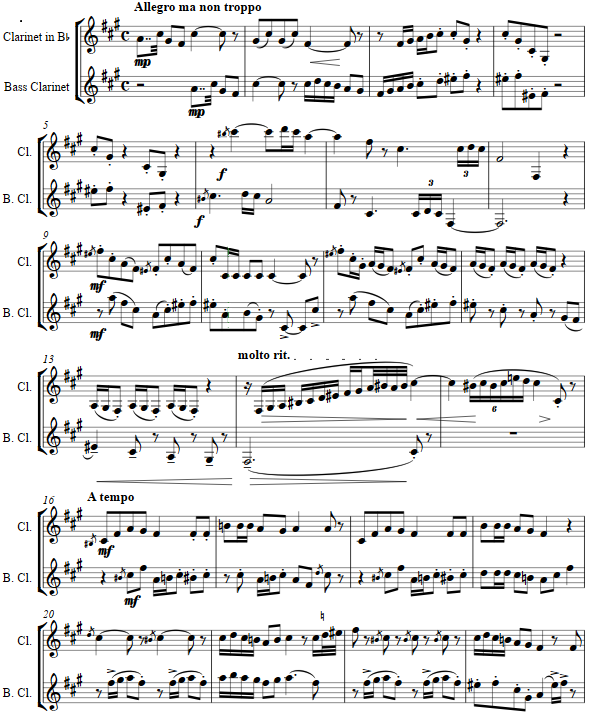Music and Texts of GARY BACHLUND
Vocal Music | Piano | Organ | Chamber Music | Orchestral | Articles and Commentary | Poems and Stories | Miscellany | FAQs
Tidbits for Clarinet and Bass Clarinet - (2023)
in memory of Abraham A. Schwadron
This duet for clarinet and bass clarinet takes two themes and weaves them together.
The first is a so-called "pioneer" or Israeli melody, Anu banu Artza. Of this song, one reads: "...the early modern pioneers (halutzim) were themselves relocated Jews hailing predominantly from Eastern Europe. These early settlers came to find a homeland and a refuge for Jews who had suffered persecution throughout the Diaspora. They sang a spirited anthem in which they asserted, 'Anu banu artza, livnot u-l’hibanot ba. We have come to our land to build and to be rebuilt in it'." In "Zionism, Israel, and Refugees," by Karen Feit, Hadassah, 30 April 2018.
The second is taken from a recording of Chad Gadya in Aramaic, from circa 15th-16th c, central Eastern Europe. The liner notes from Folkways Records FR 8920, Chad Gagya [One Kid] sources a melody to Tarnapol, Galicia
(Poland) "learned from the singer's father, a devout Reader of the Law. The mode, intensive interpretation and embellished style show preference for older, Oriental practices." The singer on that cut of the album, as noted in the liner notes, was Abraham A. Schwadron [ 1 ] (1925-1987). He was, as a UCLA tribute mentions, a "musician, composer-arranger, scholar, and educator" but also one of my teachers at UCLA in the mid-1980s. I had, read and re-read his book, Aesthetics: Dimensions for Music Education (1967) until it quite fell apart.
The first example on his album was indeed sung by him, and so I notated bits and combined them with the first melody above as source materials for this duet for clarinet and bass clarinet. Additionally, as to the clarinet, one reads also: "...Schwadron learned to play the clarinet from a friend who had taken lessons and played with a pickup band during World War II Marine Corps service." In "Music Professor Abraham A. Schwadron Dies," LA Times Archives, 24 September, 1987. He was a mere 61 years old, alas. For his death, and at my return to graduate studies at UCLA, I opted out of the music education pathway, and into composition and music theory.
3 pages, circa 3' 30" - an MP3 demo is here:
The score is available as a free PDF download, though any major commercial performance or recording of the work is prohibited without prior arrangement with the composer. Click on the graphic below for this score.
Tidbits for Clarinet and Bass Clarinet
NOTE
[ 1 ] Of Professor Schwadron, one reads: "His son, Terry, remarked at the Third International Philosophy of Music Education Symposium held at UCLA: [My] dad's most enduring lesson [was] that the question is more important than the answer. His teaching method was something the family called 'probing,' and while it was difficult to find oneself being pushed to probe, the deductions and intuitive responses he forced were long-lasting and important to students of all ages." In "The Philosophical Legacy of Abraham A. Schwadron," by Anthony J. Palmer, Philosophy of Music Education Review, Vol. 6, No. 1 (Spring, 1998).
Of the recording (and his sung performance, as I have that recording), one reads also: "...he pursued research on 'Chad Gad Yo,' an allegorical song used in the Passover service. Changing over time to reflect the movement of Jews through various cultures, numerous versions appeared of which Abe collected over 200. The analysis of these songs formed a principal interest in his last years. Twenty-five of his recorded versions--collected from the U.S., England, The Netherlands, and Italy--were issued on the Ethnic Folkways label." In "1989, University of California: In Memoriam," by Sue DeVale, Anthony Palmer, and Maureen Hooper, UCLA University Archives, 1989.
